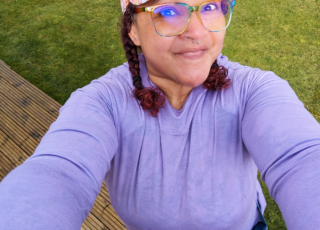WELLBEING | Why We Need To Talk About Menopause – My Peri-Menopause Journey
Firstly, I’m aware that this topic has nothing to do with camping and the great outdoors, but it does have everything to do with wellbeing. Menopause has impacted every area of my life and is presenting daily struggles that I was woefully under prepared for. Menopause is something we need to talk more about and as October is Menopause Awareness Month, I’m doing my bit by sharing my experience.

At the age of 46, I am already 4 years into my peri-menopause journey and let me tell you, It’s fucking awful.
I don’t want to spread fear about it, every woman’s journey is different and some sail through it, but It seems that my experience is not unique, with recent research finding that 32% of women would take an intervention to delay menopause if they could.
Menopause is so much more than hot flushes
If you read the word menopause and think of a stereotypical woman in her mid-50s having a few hot flushes, you’re probably not alone. Do a Google image search on the word ‘Menopause’ and it’s no wonder that this is the pervasive image many of us have in our heads when we hear that word!
AI and Menopause
I decided to see what AI thinks a menopausal woman looks like, after all, the technology is trained on real-world data, and no surprises, here’s what one came up with…

I mean really?! When I updated the prompt, it got slightly better with these…


I suppose at least it’s not all decrepit old ladies with grey hair, but how incredibly depressing are these images? AI clearly thinks Menopause looks like women who have given up, wearing pyjamas or loungewear, sat on the sofa at home clutching random body parts whilst looking like they’d rather be dead.
I mean honestly, AI definitely captures the misery Menopause can cause, but jeez, with such a depressing vision, is it any wonder so many of us are generally clueless about what Menopause is really like?
Education about Menopause
Education on the topic has historically been so sparse that unless we have first-hand experience of a friend or family member going through it, we don’t really have much of a clue about what menopause actually involves.
All I really knew is that a woman’s periods stop and that she might occasionally get a bit hot. I certainly had no idea that the transition from peri-menopause to menopause could take a decade or more, that it could start so early or that It could have such a profound impact on so many aspects of a woman’s physical and mental health.
I wish I’d known more and had been able to join the dots sooner, so I wanted to share the first symptoms of peri-menopause I became aware of and some of my experiences as well as how I’m coping on HRT 4 years into my journey.

Peri-menopause symptoms I first noticed
Intense mood swings – having never really had PMS in the past the mood swings were sudden and very intense, leading to bouts of absolute rage which really frightened me. As I don’t have periods as a result of the Mirena Coil, I didn’t identify the mood swings as being part of a monthly cycle, so didn’t realise it was hormone fluctuations causing them.
Increased anxiety – usually I could rationalise and improve anxious feelings (often a result of short term stress) using CBT methods and meditation but it felt like my body was spending days on end constantly flooded with adrenaline and nothing I did seemed to help dampen the anxious, fluttering, head-spinning, breathless feeling.
Insomnia – My wind-down routine was (is) excellent and I even totally cut out caffeine for 2 years and changed my diet, all to no avail. No matter what I did, how much meditation and lavender essential oils, extra exercise, eating well etc, I just couldn’t sleep and when I did eventually fall asleep, I was waking up well before my alarm.
Increased UTIs – for 12 months before I was diagnosed as starting peri-menopause I’d had so many UTIs I’d lost count and had no idea why I kept getting them.
Crying – I have never been sentimental or an emotional type, but for the first time in my life I was crying at adverts. I’d see something beautiful whilst out walking and would burst into tears. Being overly emotional was difficult to get my head around as I just couldn’t relate to feeling weak and fragile.
Fuzzy thinking – I started struggling to find words and my mind would go blank in the middle of a sentence, I also started to become generally more forgetful.
Inability to regulate temperature – Once I got cold I’d stay cold for hours. I could be wrapped in a jumper, blanket and hug a hot water bottle with the central heating on and still take hours to warm up. I also noticed the reverse, I was often getting uncomfortably warm and struggle to cool down.
Weight gain – Despite my diet not changing and still exercising as much as I’d always done, I was gaining weight and suddenly, just a few days eating what I wanted (e.g. at Christmas or on holiday) and not counting calories would lead to significant weight gain. To lose that weight, I found I really struggled and that I had to eat under just 1,200 calories a day AND up my exercise to see weight come off at a much slower weight than it previously had done.
Water retention – I noticed that as well as the upward weight trend that day to day my weight could fluctuate by as much as 2kg. Slowly I realised looking in the mirror that some days my face and hands looked fatter than on other days, and I realised these fluctuations must be down to water retention, again, something I’d never experienced in any noticeable way in the past.
Increase in migraines – I’ve always suffered from migraines and take Triptans as and when needed. My migraines (usually 4-5 a month) ramped up and I could have a migraine every single day for as many as 10 days in a row. I also found that they responded less to my Triptan medication and coincided with increases in other symptoms like bloating, increased hunger, anxiety and mood changes so I eventually realised the migraines were down to my hormones too.
It’s a veritable shit-show of symptoms that I really wouldn’t wish on anyone.
As if all of the above weren’t enough already to be dealing with, since these first early symptoms, I can now add brittle nails, palpitations, dry skin, steadily increasing fasting blood sugar, frequent dizziness and hair that’s thin and falling out at an alarming rate into the mix. It’s a veritable shit-show of symptoms that I really wouldn’t wish on anyone.

Diagnosed at 42
I went to my GP with a long list of symptoms and said that I’d not felt like myself in months. She asked about my mum’s experience of menopause (who told me she sailed through it in her early 50’s and didn’t even notice) and suggested a blood test to check my Estrogen levels.
The test results showed exceptionally low Estrogen levels as did a second blood test. I was told I was experiencing peri-menopause, which at 42 hit me hard as it was something I’d not considered at that point and wasn’t expecting to happen for perhaps another decade, but it was a huge relief to know there was a reason why I was feeling this way and that I wasn’t losing my mind.
Lacking a holistic view
It’s fair to say that at the start, viewed holistically, my symptoms did prompt a GP to suspect peri-menopause, and yet since, when it has come to treatment, each and every symptom has been inexplicably treated as separate issues and I’ve experienced zero continuity of care.
I’m very grateful to have had (NHS and some private) multiple blood tests and investigations to check everything from blood sugar and thyroid function through to heart function and even brain scans. Of course, ruling out something more sinister is prudent, and I’ve been given a clean bill of health on all fronts, so clearly, something else is responsible.
Do a bit of research and you’ll find that all of the above are well-documented as being symptoms of a menopausal hormone imbalance, so it’s not a giant leap in logic to seek to treat the root cause, instead of all the various symptoms.
Barriers I encountered
Menopause awareness and education among medical professionals is patchy in my experience, and research shows that some doctors leave medical school with no menopause education at all.
“41% of UK medical schools do not have mandatory menopause education on the curriculum.”
In fact, Menopause Support cites that 41% of UK medical schools do not have mandatory menopause education on the curriculum.
So that’s a process that affects 50% of the population that can last for many years that can cause huge and varied health problems, that potentially 41% of GPs could know absolutely nothing about. Doesn’t seem logical really does it?
Some GPs will choose to learn about or even specialise in this area of course, like the brilliant Dr Joanna Newson, but it is not a routine part of medical training and some GPs will not have a clue about the myriad symptoms or the most efficient treatment, let alone be up to date with the latest research or NICE guidelines.

One of the many problems facing us is that appropriate care and support is not always provided. I have genuinely lost count of the number of times a GP has suggested to me in the past 4 years that I should be on anti-depressants when I’m not in the least bit depressed, do not have a low mood and am simply experiencing transient mood changes in sync with my monthly cycle that are the direct result of peri-menopause.
I did suffer from postpartum depression. 25 years ago. I was medicated and had CBT. I got well and I have been off medication for some 15 years. I do not suffer from a persistent low-mood and have not considered myself to be depressed for well over a decade.
Seeing a diagnosis like this on my medical record and immediately jumping to the assumption that 25 years later I must still be depressed is at best lazy. I broke my wrist when I was 15 but It healed. That doesn’t mean I still need to be wearing a cast.
Thousands of peri-menopausal women are wrongly being prescribed anti-depressants, (check out Bad Medicine: The Menopause) despite evidence stating that this type of medication should not be routinely used to treat mental health problems that have arisen as a result of menopause. Indeed the National Institute for Health and Care Excellence (NICE) states:
“It has not been shown that antidepressant drugs called SSRIs and SNRIs can help with low mood during menopause if you haven’t been diagnosed with depression.”
Various GPs I’ve seen have largely viewed each of my symptoms as separate issues and are still failing to treat the root cause. Early on, one GP I saw openly said rather apologetically to me that he didn’t really know anything about menopause and asked if I wanted HRT which he then prescribed in tablet form which contained both Estrogen and Progesterone.
Never opposed to HRT, I picked up the prescription but did some research prior to starting the tablets. I found out that as I already had the Mirena Coil fitted which releases Progesterone into my body, this meant that the tablet wasn’t the right option for me and an Estrogen only form of HRT was more suitable. A female GP I later saw told me the tablets should never have been prescribed to me.

Trying the natural route
The lack of support and patchy knowledge worried me, It made me feel like I couldn’t trust doctors to help me, so I decided not to start HRT at that time and instead looked into natural ways of coping with my symptoms.
I went on to spend a year and a half trying a plethora of different supplements and lifestyle changes. Some, like Black Cohosh made my symptoms worse, others made no discernable difference whilst others like Ashwagandha, CBD and 5HTP did seem to have a positive impact and helped a little.
I struggled on for a full 18 months before monthly and twice-monthly cycles of anxiety, insomnia etc. got so bad that I once again found myself in crisis and unable to function. A friend told me about the Estrogen gel she was using and what a difference it had made to her.
I made another doctor’s appointment, this time speaking to a female GP who had a better understanding of menopause treatment and agreed that the gel would be a great fit for me.
Within 3 days of using it my life had transformed, I felt like (almost) me again and I could function so much better. I sent that GP a card and a handwritten letter of thanks telling her how much her decision had changed my life for the better. I can’t explain the gratitude I felt to feel almost ‘normal’ again after 2 years of feeling like I was losing my shit.
Knowledge is power
Women openly talking about and sharing their experiences is such an important part of menopause education, and regardless of how far away it may be for you or your loved ones, education is the key to navigating what can be an extremely difficult and drawn-out process.
Of course, anecdotal evidence and Googling things is never a substitute for medical training and there are good GPs out there who do know their stuff when it comes to menopause. However, my own experience and the stories I’ve heard from many other ladies suggest those with good and current menopause knowledge are few and far between.
Educating ourselves then means we can better advocate for the proper support whether that may be HRT, lifestyle, talking therapy or a combination of things.
I joined a few menopause support groups on Facebook, listened to every single podcast from the Menopause Dr and whilst my symptoms are somewhat under control at the moment after another recent blip (I say blip, it was a horror show of anxiety and insomnia running in cycles every 2-3 weeks until my dose of estrogen was increased again), I’m much better than I was, but perhaps at 70% of what the normal me was like prior to peri-menopause.
How I feel seems to fluctuate day to day – yet through it all, I’ve never once felt low or depressed. A lifetime of learning healthy coping mechanisms really has helped me, so for that I’m very grateful, but the struggle can be exhausting, frustrating and scary at times.
I might have a couple of weeks where I feel good. I sleep well, I’m not anxious, I’ve got energy and focus, I’m emotionally robust and fully present, but then I’ll have a period of a few days or even weeks when it feels like I’m going through back to back PMS cycles with no let-up in between when it feels like managing my symptoms becomes a daily juggling act.
It’s a continual learning curve.
Treating symptoms, not the root cause
The biggest issue I’ve had and still face is the lack of holistic treatment. Estrogen has helped a lot but how much I need, how that need changes day to day and how that balances with whatever levels of Progesterone and Testosterone I have in my body at any given time is not monitored or taken into consideration.
Balance the hormones to alleviate symptoms, rather than simply medicate the symptoms.
A resurgence in symptoms that were previously controlled and a host of new symptoms indicate to me, that hormone-wise, something is once again out of whack.
Of course, I could be wrong, but I have an intuitive knowledge of my own body which usually proves to be right and surely menopause treatment best practice would be to balance the hormones to alleviate symptoms, rather than simply to medicate the symptoms?
I’ve already spent hundreds of pounds on different supplements, private blood tests, books and online resources to educate myself and enhance my wellbeing and I’m on the waiting list to visit a private menopause clinic 100 miles away.
Given menopause affects half of the population, it’s worrying and deeply wrong that better support is not accessible through the NHS and that so many of us are facing such a struggle. I count myself extremely lucky that I’m in a position to be able to consider a private clinic at all, which further illustrates the emergence of a two-tier UK health service.
It’s about time we stopped pretending that women should just shut up and put up or that it’s a time in our lives that we should be ashamed of.
Quite simply, menopause has proven to be the biggest health challenge of my lifetime and although now 4 years in, HRT, lifestyle changes and a whole bunch of supplements are helping, it’s a bumpy and incredibly difficult ride and one that I’d much prefer not to be on.
Things that have helped me
- Mindfulness and meditation to help with the anxiety and mood swings
- Ashwagandha, 5HTP & Holy Basil to dampen down cyclical anxiety
- Lifestyle changes including more exercise (particularly cold water swimming and running) and low/rare alcohol consumption
- CBD capsules before bed
- Cutting out caffeine
- Research has been a huge part of coping, as I’ve finally come to understand the far-reaching impact fluctuating hormones can have and how low Estrogen in particular impacts me individually
- Going onto HRT which for me is Estrogen gel and the Mirena coil
January 2022 Update
After months taking Ashwagandha and 2 years using Estrogen gel, my Testosterone had sky-rocketed and my Estrogen levels were through the roof – so I was advised back in November to come off them both.

My most recent blood tests show my Androgens are now back down within normal ranges but I’ve been diagnosed with “Perimenopause Disorder” and have been referred to one of the few specialist NHS menopause clinics in the UK. It’s a 7-month wait, but hope is on the horizon.
Menopause resources
- NHS Menopause Overview, Symptoms & Treatment
- Menopause Experts Group
- Menopause diagnosis NICE guidelines
- My Menopause Doctor – Dr Joanna Newson
- Menopause TED talks on YouTube
- Channel 4 – Davina McCall: Sex, Myths and the Menopause
- The All Party Parliamentary Group On Menopause
If you are currently trying to navigate through menopause or are supporting a loved one through the process, I wish you all the best and would love for you to share your experiences in the comments below.

Shop Related Products
Please consider helping us keep this blog running by browsing these related products. As Amazon affiliates, we earn a small % back from any sales made which help towards funding the running costs of this blog.
Where to next?
- WELLBEING | Does A Gratitude Journal Really Increase Wellbeing? My 2 Month Gratitude Journal Experiment
- WELLBEING | A Snowdonia Walk And Thoughts On Experiencing Adversity Positively
- WELLBEING | My 30 Day Naturopathica CBD Wellbeing Experiment
- WELLBEING | Whispers From Routin Brig Waterfall, Scotland - April 25, 2024
- TRAVEL | The Little Coffee Bag Co. Delicious Coffee On The Go – Review - April 16, 2024
- NEWS | Easy Glamping With Easy Camp New Moonlight Spire Tipi Tent - April 15, 2024























![CAMPING | Here’s How To Stay Warm In Your Tent – Warm Camping Tips [Updated 2024]](https://www.campingwithstyle.co.uk/wp-content/uploads/2024/02/shell0816_photorealistic_realistic_photo_of_the_inside_of_a_c_dd26c3c4-c779-4081-85b0-72e66a81b03b_1-320x230.png)

![GEAR | The Best Warm Sleeping Bags For Spring Camping Trips [Updated March 2024]](https://www.campingwithstyle.co.uk/wp-content/uploads/2024/02/10-best-warm-sleeping-bags-2024-320x230.png)



